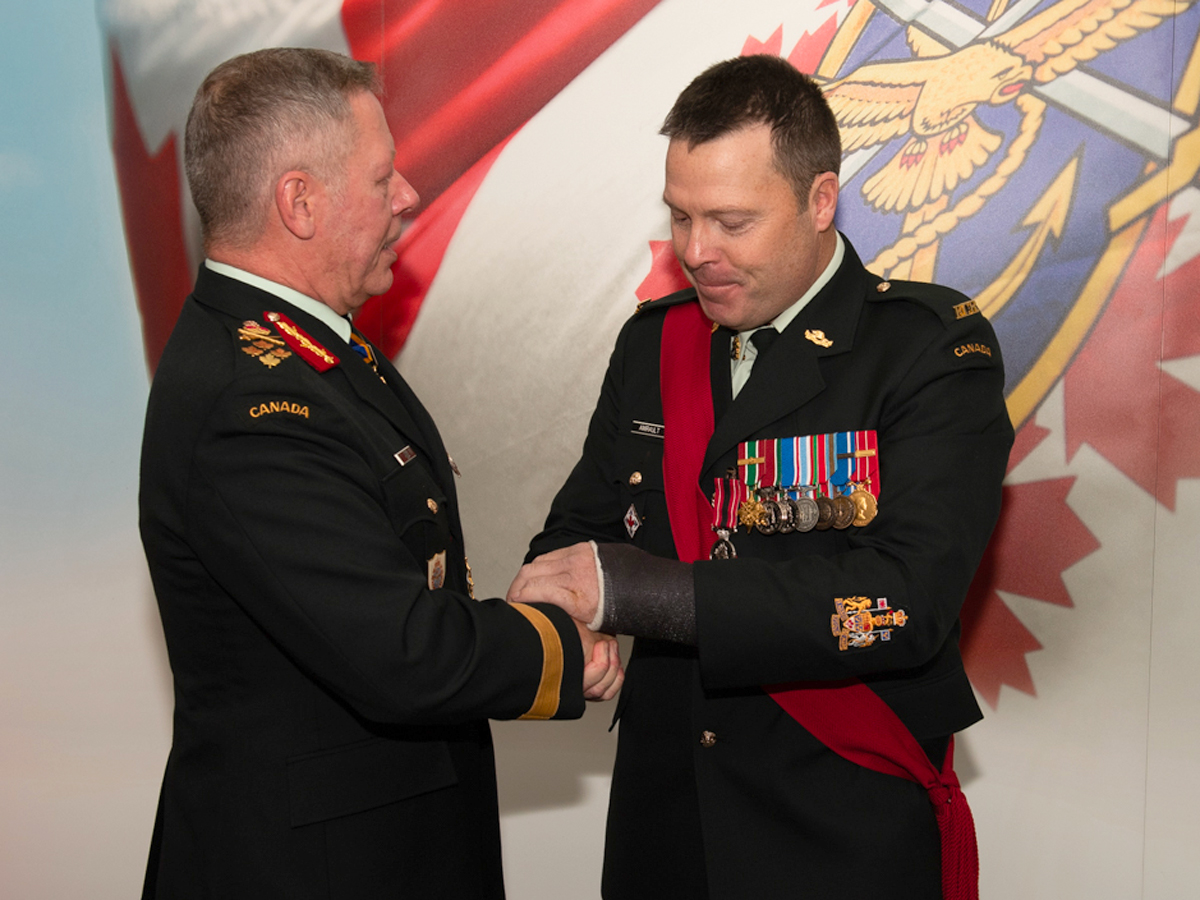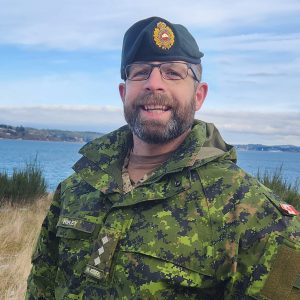
Chief of Defence Staff, Gen Jonathan Vance presents CWO (Retired) Brad Amirault with a Sacrifice Medal at Juno Tower in Halifax on Nov. 23. Photo credit: Sgt Chelsea Hutson
Peter Mallett, Staff Writer ~
A retired career soldier with family ties to CFB Esquimalt says the recent awarding of a Sacrifice Medal has been the perfect tonic to accelerate his recovery from deployment injuries, mental and physical.
Chief Warrant Officer (Retired) Brad Amirault received the medal from General Jonathan Vance, Chief of the Defence Staff, in a formal ceremony at Juno Tower at CFB Halifax on Nov. 23.
The Sacrifice Medal was established in 2008 as a replacement to the Wound Stripe medal and is part of a continued effort by the Government of Canada to provide formal recognition to those who die as a result of military service or are wounded in action.
CWO Amirault says having the medal presented by his friend and former Commanding Officer Gen Vance was an emotional and heartfelt moment.
The two men shared a hearty handshake in the hallway prior to the ceremony and even some tears during the proceedings as they recounted some shared, difficult times where they drew strength from each other as warriors do.
“Having the senior Canadian Forces commander present the medal in front of my immediate family members was an honour that I will proudly wear for the rest of my days.”
Adding to the emotions, says CWO Amirault, was the outpouring of support from dozens of family members and friends at a reception held the next day.
“It was huge to have all these people supporting me and to see a video presentation of my career played during the ceremony. I truly believe the moment helped me effectively communicate to my family what I could not verbalize. I was reminded of my roots and how important it is to have family.”
CWO Amirault had a 34-year career in the Canadian Armed Forces until injuries sustained during training, and on his operational tours in Bosnia, Haiti, Afghanistan led to his transition out of the military in 2018.
Today, he suffers from persistent pain in the lower back, neck, hip and ankles, Post-Traumatic Stress Disorder (PTSD), anxiety, and depression.
While in Bosnia, he witnessed the atrocities of war that still haunt him to this day. His injuries, both mental and physical, continued to accumulate during his career as an infantry soldier serving in the Oka crisis of 1990, Bosnia in 1992-93, and 1996, the Middle East in 2003, Haiti in 2004, and Afghanistan in 2010.
He says recovery from his trauma-related injuries took a giant leap forward when he was presented the medal. His daughter, Leading Seaman Lily Amirault of Naval Fleet School Pacific helped organize the ceremony and the informal reception the following day at a nearby hotel. LS Amirault was also instrumental in putting out the successful request for Gen Vance to present the medal.
“I think my father is one of the most deserving people for this medal and I was so happy to see him overcome with emotion and tears of happiness when he received it from Gen Vance,” said LS Amirault. “But it was also a bitter-sweet moment because when I looked at all the images of my father from 10 or 20 years ago during the event’s video presentation, and the toll his injuries have taken on him, the moment was also very painful for myself and the family as a whole.”
Other family members attending the ceremony with military ties included his cousin Colonel John MacDonald, 36 Canadian Brigade Group Commander, and his son Corporal Nicholas Amirault, a member of 33 Signal Regiment of the Royal Canadian Corps of Signals in Ottawa, Ontario.












